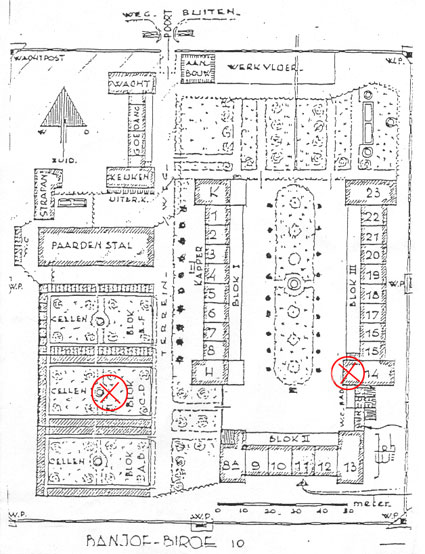My first job
All of us, as from the age of fifteen years old had to work, I was almost 17 years old so I had to join the group of grass cutters in our camp. We had to cut each and every grass stalk with a small knife or with our hands, we were squatting on the ground, it was not a heavy but a very tiring job.
A Japanese military, Mr. Ito, stood there with a whip in his hand watching us. We were not allowed to talk or to sit on the ground, we could only squat on our haunches, and that was painful after a few hours. In the beginning we had to work three hours only but after a while it became four to five hours a day.
The boys of our age had to do the hard work in the kitchen, they received some extra food.
They also had to carry the tea barrels around in the morning and our “starch breakfast”.
In the afternoon our “lunch” and then our last daily meal “starch-soup” was also brought to us by the boys and dished up by one of the kitchen ladies.
The boys also had to empty the poop-barrels, an extremely dirty job. The boys had to empty the sewers coming from the toilets into those poop-barrels and bring them outside the camp.
Later on, when the boys had to leave our camp, the work was taken over by young women and the girls from our camp.
Our home, was now a bed only, planks on the floor and the dirty mattresses on top of them and then those bed bugs. We often tried to clean the mattresses and air them for a short while outside. Every morning we killed some of those bugs. Many of us had mosquito nets but it didn't protect us against the malaria mosquito's. Banyu Biru was a real malaria region so we found out later.
Because we where all living so close together, people began to quarrel, mostly about the children. Those poor children just hang around all day they had nothing to do, just like my little sister Jansje. My sister Henny helped my mother a little with washing our clothes and sheets. They went to the bathroom to fetch ( cold ) water. This water came out of quite narrow pipes where we had to take our daily showers, women, children, boys and the girls all together, in the beginning with some soap but later on only with cold water.
Luckily my mother had a small washtub and some soap, but only that piece of soap was soon finished. Our mothers had to clean our clothes with salt and cold water, the clothes wore out very rapidly this way.
On the 10 th of June that same year, 400 women and children were transported to Banyu Biru camp 11, this was a military complex, barracks. The camp was behind our camp 10, not too far-away from us. Of course they were happy to leave this prison with those high walls and it gave us, who had to stay behind, a little more room.
My mother asked if she could get a cell for the four of us. Thank goodness we could leave ward 14 and move to a cell in group C - D , that gave us at least more privacy, but we had very little room to move around. We put two mattresses on the three cabin trunks, for my mother and Jansje, and two on the floor for Henny and me.
During the day we put Henny's and my mattresses on top of each other and we left the door open,. At night we left the door ajar, so that we still had some fresh air in the cell. The nights were quite cold in Banyu Biru.
At ten o'clock all the lights were put off. That was the Japanese order to send us all to bed together with our bed bugs.
A normal life seamed so far-away from us, this prison life was so unreal. I have very often asked myself if I would ever see Sumber Sewu back again, if I could ever walk again through the jungle with my father. I often dreamed that I was with my father, but when I woke up in the morning he was gone.
Banjoe Biroe 10

